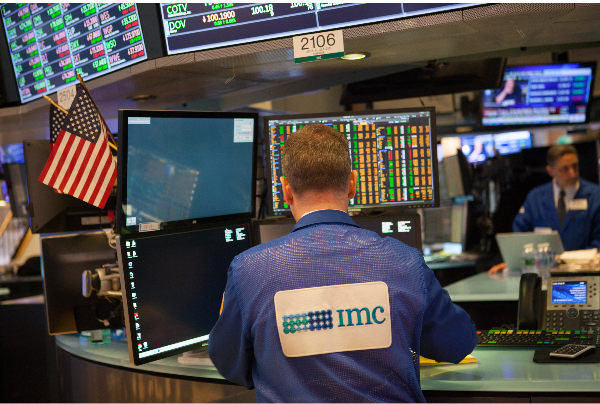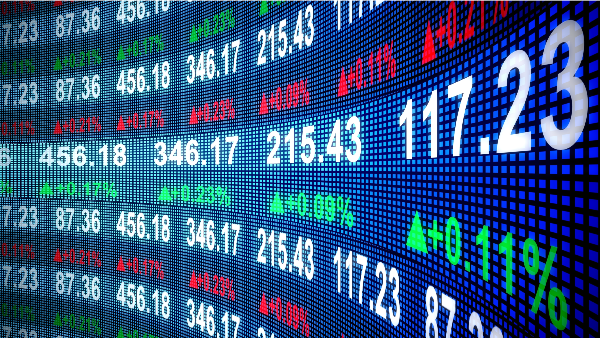What does it Mean to Own a Stock?
When you own stock in a company you are an owner of a corporation. You've delegated management to an executive team led by a Chief Executive Officer. Their goal is to make money for the investors, which you are one of. The investors elect a board of directors to govern the company.
What Does it Mean to Buy Stocks?
Buying stocks is like buying goods at an open market. Each stand has a unique set of products. In the stock market, you can buy different types of stocks. The person running the stand may haggle a price with you.
In the stock market, you are also haggling for a price. However, you're haggling with millions of other investors at the same time.

When you buy that stock, you are buying shares from another investor on the open market. If you're a retail investor, you likely bought a small lot of shares from a mutual fund or market maker.
These larger market participants sold these shares in bulk. You were one of many investors who bought from this market maker. In this one transaction, the market maker may have sold a lot of shares worth millions.
Retail investors do not typically buy stocks straight from companies. There are exceptions to this when companies have special programs. These direct purchasing programs are worth checking out.
Large investment funds and investment banks do buy company stock from the company. This happens during a companies initial public offering (IPO).
Companies may also sell shares to the public from their retained shares. Retained shares are held by the company. These shares were on a company's ledger during the IPO or purchased during a company buyback.
When a company sells retained shares they are a market participant just like you. Company's are required to report stock transactions. They typically buy and sell shares on a schedule with limit orders.
What's the Meaning of Stock Prices?
A stock price is the last price the stock was purchased for.
Brokerages will give you quotes in real-time while the media will give delayed quotes. Note that "real-time" is still slower than price quotes received by algorithmic traders.
For large stocks with lots of trading, the price is usually near the bid/ask spread. What market participants are willing to buy a stock for is the bid. What market participants are willing to sell a stock for is the ask. The ask will be higher than the bid.
A stock price is what thousands of investors believe the price should be. There is no one person or entity that sets the price of a stock. There are market makers who will help facilitate the bid/ask spread, but they are not setting the price.
The stock price does not represent the real price of the company. This price is the book value of the company. This is the price of the company if every asset in the company was sold and all liabilities paid off. The price will never match the book value. Investors also take into account a companies growth and potential growth.
How do Stocks and the Stock market work?
Company stocks are sold on the stock market. The stock market facilitates the buying and selling of stocks. Transfer agents keep track of company shares and work with brokerages to know who the share owner is.

Tell me the Difference Between Stocks and Other Instruments?
Stocks are ownership of companies. When you buy stocks, you're buying a portion of the company. You expect the value of the company to grow as they increase revenue, earnings and assets. This growth comes from the efforts of management and its employees. This effort creates products for a market demand.
Bonds are an ownership of debt. You own a debt obligation that an entity needs to pay you back for. If a company you invest in goes bankrupt, the company's bond holders get paid from the company's remaining assets before you get paid as an investor.
Commodities are a basic raw material used to build more complicated products. Commodities are sold uniformly. For example, corn is a commodity. One bushel of corn by and investor will be the same as the two million bushels of corn bought by a food processor. Company's will manufacture goods from commodities or process the commodities.
Commodities will not increase in value because of the efforts of others like companies. Commodity prices are driven purely from the supply and demand of that commodity.
Why Should I Buy Shares of Stock?
When you buy a share of stock, you own a portion of a company. Company's give shareholders certain rights, dividends, and grow in value if managed well. A large portion of wealth is in stocks.
Shareholder Rights
Shareholder rights vary between companies. Each company has its own articles of organization and business governance. Typically, public companies give shareholders the right to vote for board directors.
These directors manage the company governance. The directors hire and fire the CEO on behalf of the shareholders.
Shareholders also have the right to vote for changes to the company's governance. Some of these examples include, but are not exclusive to:
- Board of Director term limits
- Significant Mergers
- Company policies
- Company scope
Stocks Pay Dividends
A dividend is a cash payout to investors from the company's earnings. If you own the stock before a certain date, called the ex-dividend date, you will earn this dividend. The ex-dividend date is typically a month before the actual payment, but this does vary.
Dividends can also be stock dividends. This is where investors earn more company stock instead of cash.
You own what is Left if the Company Decided to Close up Shop
If a company goes bankrupt, you will get paid cash if there is any cash left after the company's assets are liquidated. Liabilities must also be paid. A major liability is bond holders who, as we mentioned earlier, will be paid first before investors are paid.
Part of a Series for Beginner Investors












What does it Mean to Own a Stock?
When you own stock in a company you are an owner of a corporation. You've delegated management to an executive team led by a Chief Executive Officer. Their goal is to make money for the investors, which you are one of. The investors elect a board of directors to govern the company.
What Does it Mean to Buy Stocks?
Buying stocks is like buying goods at an open market. Each stand has a unique set of products. In the stock market, you can buy different types of stocks. The person running the stand may haggle a price with you.
In the stock market, you are also haggling for a price. However, you're haggling with millions of other investors at the same time.
When you buy that stock, you are buying shares from another investor on the open market. If you're a retail investor, you likely bought a small lot of shares from a mutual fund or market maker.
These larger market participants sold these shares in bulk. You were one of many investors who bought from this market maker. In this one transaction, the market maker may have sold a lot of shares worth millions.
Retail investors do not typically buy stocks straight from companies. There are exceptions to this when companies have special programs. These direct purchasing programs are worth checking out.
Large investment funds and investment banks do buy company stock from the company. This happens during a companies initial public offering (IPO).
Companies may also sell shares to the public from their retained shares. Retained shares are held by the company. These shares were on a company's ledger during the IPO or purchased during a company buyback.
When a company sells retained shares they are a market participant just like you. Company's are required to report stock transactions. They typically buy and sell shares on a schedule with limit orders.
What's the Meaning of Stock Prices?
A stock price is the last price the stock was purchased for.
Brokerages will give you quotes in real-time while the media will give delayed quotes. Note that "real-time" is still slower than price quotes received by algorithmic traders.
For large stocks with lots of trading, the price is usually near the bid/ask spread. What market participants are willing to buy a stock for is the bid. What market participants are willing to sell a stock for is the ask. The ask will be higher than the bid.
A stock price is what thousands of investors believe the price should be. There is no one person or entity that sets the price of a stock. There are market makers who will help facilitate the bid/ask spread, but they are not setting the price.
The stock price does not represent the real price of the company. This price is the book value of the company. This is the price of the company if every asset in the company was sold and all liabilities paid off. The price will never match the book value. Investors also take into account a companies growth and potential growth.
How do Stocks and the Stock market work?
Company stocks are sold on the stock market. The stock market facilitates the buying and selling of stocks. Transfer agents keep track of company shares and work with brokerages to know who the share owner is.
Tell me the Difference Between Stocks and Other Instruments?
Stocks are ownership of companies. When you buy stocks, you're buying a portion of the company. You expect the value of the company to grow as they increase revenue, earnings and assets. This growth comes from the efforts of management and its employees. This effort creates products for a market demand.
Bonds are an ownership of debt. You own a debt obligation that an entity needs to pay you back for. If a company you invest in goes bankrupt, the company's bond holders get paid from the company's remaining assets before you get paid as an investor.
Commodities are a basic raw material used to build more complicated products. Commodities are sold uniformly. For example, corn is a commodity. One bushel of corn by and investor will be the same as the two million bushels of corn bought by a food processor. Company's will manufacture goods from commodities or process the commodities.
Commodities will not increase in value because of the efforts of others like companies. Commodity prices are driven purely from the supply and demand of that commodity.
Why Should I Buy Shares of Stock?
When you buy a share of stock, you own a portion of a company. Company's give shareholders certain rights, dividends, and grow in value if managed well. A large portion of wealth is in stocks.
Shareholder Rights
Shareholder rights vary between companies. Each company has its own articles of organization and business governance. Typically, public companies give shareholders the right to vote for board directors.
These directors manage the company governance. The directors hire and fire the CEO on behalf of the shareholders.
Shareholders also have the right to vote for changes to the company's governance. Some of these examples include, but are not exclusive to:
Stocks Pay Dividends
A dividend is a cash payout to investors from the company's earnings. If you own the stock before a certain date, called the ex-dividend date, you will earn this dividend. The ex-dividend date is typically a month before the actual payment, but this does vary.
Dividends can also be stock dividends. This is where investors earn more company stock instead of cash.
You own what is Left if the Company Decided to Close up Shop
If a company goes bankrupt, you will get paid cash if there is any cash left after the company's assets are liquidated. Liabilities must also be paid. A major liability is bond holders who, as we mentioned earlier, will be paid first before investors are paid.
Part of a Series for Beginner Investors